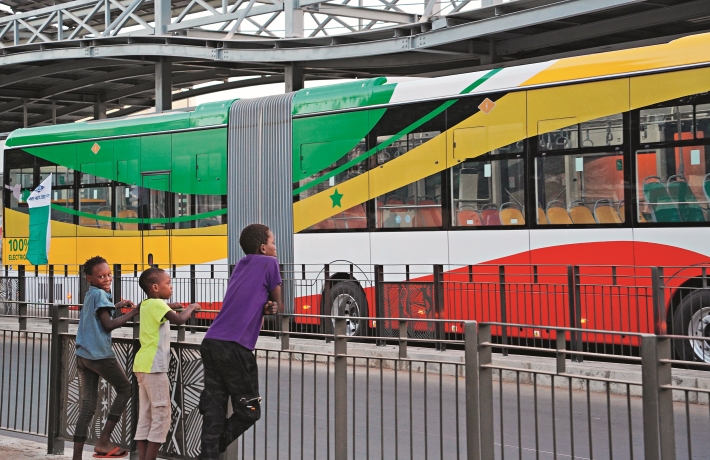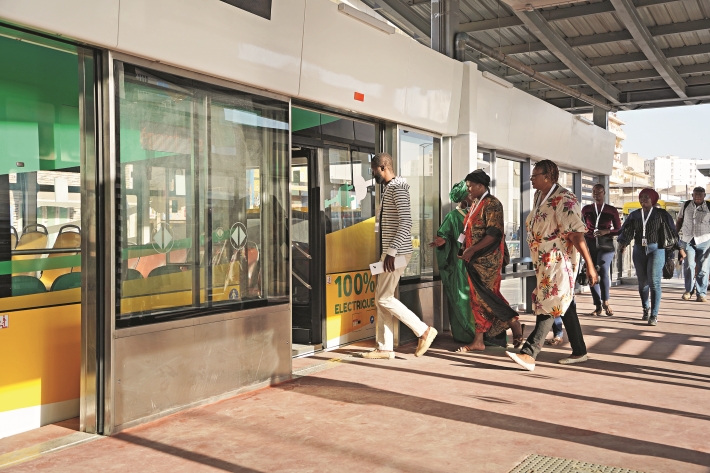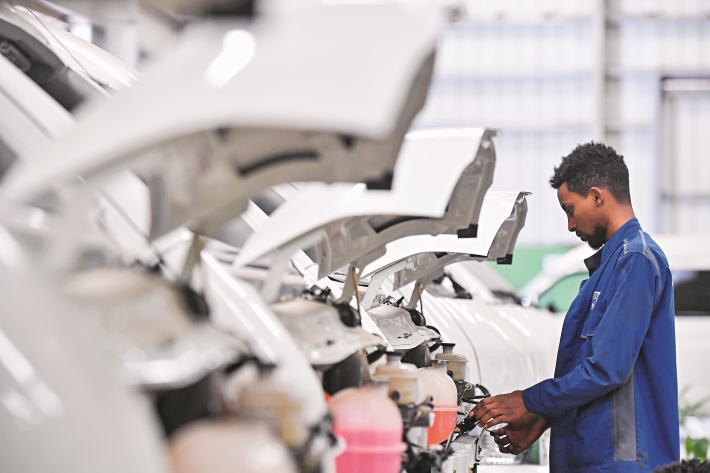|
||||||||||
| Home Nation World Business Opinion Lifestyle ChinAfrica Multimedia Columnists Documents Special Reports |
|
||||||||||
| Home Nation World Business Opinion Lifestyle ChinAfrica Multimedia Columnists Documents Special Reports |
| ChinAfrica |
| Paving the Way |
| China-Africa cooperation enables the electrification of transportation on the continent |
| By Ge Lijun and Aly Diouf | VOL. 16 June 2024 ·2024-06-11 |

An electric bus is seen at a BRT stop in Dakar, Senegal, on 30 December 2023 (XINHUA)
Fary Dieng has had a passion for driving since childhood. As an adult, she obtained her driving licence a few years ago. With a great interest in the development of public transport, she has closely followed the Bus Rapid Transit (BRT) project in Dakar, on which work began on 28 October 2019.
One day, while visiting the site, she came across a job advertisement for drivers and immediately applied. With her confidence and experience, she was able to land the job, becoming the first female BRT driver in Senegal. Last January, she realised her dream by taking part in the first dry runs.
Dieng is one of the many beneficiaries of this environmentally friendly initiative. The project was carried out by China Road and Bridge Corp., and the electric buses were supplied by China Railway Rolling Stock Corp. This is Senegal’s first urban rapid bus service and a flagship project of the Plan for an Emerging Senegal. This service marks an important step towards sustainable mobility, a trend that other African countries are following to improve their public transport.

Passengers board an electric bus during the opening ceremony of the entire BRT line in Dakar, Senegal, on 27 December 2023 (XINHUA)
Pure electric buses
The commercial operation of the BRT started on 15 May. To mark the occasion, at a press conference on 13 May, Dakar Governor Al Hassan Sall and Director General of the Executive Council for Sustainable Urban Transport Thierno Birahim Aw presented the measures taken to ensure the safety of the line.
They also announced that the BRT will initially serve 14 of the 23 planned stations, including three major interchanges. These stations are located in 14 of the most densely populated and congested municipalities in the Dakar region. “Agreements have been reached with the traffic police and the commander in charge of BRT security. The corridor will be permanently secured, with the presence of a transport company at crossroads, especially where there is a lack of signage,” said Sall, who stressed that the 18.3 km corridor will be secured 24 hours a day.
As far as fares are concerned, Aw said the prices will range between 400 and 500 CFA francs ($0.66-$0.82), with a “social fare” for 16 percent of users, which will range between 200 and 250 CFA francs ($0.33-$0.41). This pricing policy aims to make the service affordable to all. The BRT project is also designed to stimulate employment, with the aim of creating 1,000 direct jobs, 700 of which have already been filled.
The BRT is designed to carry up to 300,000 passengers per day. The $691 million project is supported by the World Bank, the European Investment Bank and the Green Climate Fund.
The BRT fleet consists of 158 all-electric buses equipped with air conditioning and on-board Wi-Fi. It is part of the Senegalese government’s strategy for sustainable urban transportation and represents a significant step in reducing carbon emissions. Indeed, with the BRT, Dakar expects to have a clean, high-frequency, high-capacity public transport network that will cut by half the travel time between down-town Dakar and Guédiawaye and, most importantly, reduce 59,000 tonnes of carbon emissions each year. It is the only transport project registered by Senegal at COP 21 as part of its commitments to reduce greenhouse gas emissions, and is linked to an energy and digital transition strategy.
As an integrated project, the BRT will promote urban development along the route and improve the quality of life of local residents, while playing a positive role in environmental protection and sustainable development. According to Aw, “the BRT is an integrated project that will bring about positive changes, with 40 km of new drainage network, street furniture, public lighting and landscaping.”

A worker assembles electric minibuses at a factory in Addis Ababa, Ethiopia, on 6 March (XINHUA)
A popular environmental practice
In addition to Senegal, electric buses are being used in other African countries, notably Ethiopia.
On the streets of Addis Ababa, the Ethiopian capital, a large number of electric minibuses await passengers. They are supplied by Chinese company Golden Dragon Buses, exported to Ethiopia as CKD (completely knocked down) kits and assembled by local company Belayneh Kindie Metal Engineering Complex (BKMEC). To date, around 20 drivers in Addis Ababa have replaced their old petrol vehicles with these electric minibuses. The Ethiopian company also assembles electric buses imported from China to meet the growing demand for electric vehicles (EVs) in the country.
As part of its development vision for 2021-2030, the Ethiopian government has announced plans to import 4,800 electric buses and 148,000 other types of EVs over the next 10 years to reduce the country’s dependence on petrol vehicles.
According to BKMEC Managing Director Besufekad Shewaye, the company has been importing EVs from China using the CKD method since mid-2023. This method of importation significantly reduces transport costs. In addition, while the tariff on the import of finished cars is around 15 percent, it’s almost zero for the import of disassembled ones, which is also one of the measures taken by the Ethiopian government to encourage the development of electric cars and the associated technology transfer. The assembly of these electric minibuses also supports local employment. Around 75 people from the company are involved in assembling the 216 imported electric minibuses.
Shewaye is convinced that the prospects for electric vehicles in Ethiopia are promising. “The arrival of more and more Chinese EVs in the local market will help save energy and reduce greenhouse gas emissions,” he told Xinhua News Agency.
In East Africa, Rwanda is taking steps to improve its tourism environment and enrich the visitor experience to attract more international tourists amid a booming tourism industry. It is clear that the promotion of EVs not only meets environmental requirements, but also the development trends of the tourism sector. To actively promote the use of EVs, the Rwandan government has also introduced a number of incentives, such as tax exemptions and preferential electricity tariffs for charging these vehicles.
More than three months ago, BasiGo, a Kenyan company specialising in electric vehicles, imported four electric buses from China and launched a pilot project in Rwanda in collaboration with public transport operators on four routes. According to Doreen Orishaba, BasiGo’s market manager in Rwanda, electric buses offer many advantages in terms of environmental protection, operating costs and passenger experience. Each electric bus manufactured in China and put into service in Rwanda can reduce up to 30 tonnes of emissions, helping to protect the environment.
Ultimately, it is the local residents who benefit most from this trend towards greener mobility. In addition to her role as a BRT driver, Dieng has also taken on the role of assistant trainer. She helps train new drivers, multiplying the positive impact of this sustainable mode of transport. “It is a great source of pride and honour. Through my efforts, I hope to get more people involved in green public transport and serve more people,” she said.
|
||||||||||||
| About Us | Contact Us | Advertise with Us | Subscribe |
| Copyright Beijing Review All rights reserved 京ICP备08005356号-5 京公网安备110102005860号 |